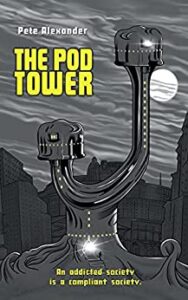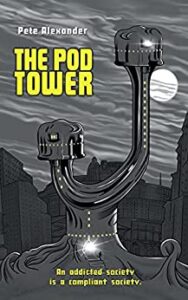The Pod Tower by Pete Alexander

It’s the winter of 2057—the coldest for nine years. For failed family man Marcus Calvert, however, there are other matters on his mind.
Mistrustful of his government and cynical about change, he has chosen to live beyond the Outer Zones, free from the digital age and a world he no longer feels any affinity towards.
But now his son’s future looks bleak, threatened by the very secrecy that even now still surrounds his family’s past.
Amid rumours that his own idyllic lifestyle is under threat, Calvert begins a search for the truth, only to discover that everything he has learned since early childhood has been a lie.
On the horizon, Mother City casts its shadow over Sector 21, one he has spent the last twenty years determined to avoid.
But time is fast running out, and that option looks set to expire.
The Pod Tower Review
I was compensated with a small amount for my time and effort in reading the book and writing this review. However, all thoughts and opinions expressed are my own and are based on my honest personal experience reading the book. Nor did the author in any way shape or form ever pressure me to give a positive review.
The Pod Tower, a compelling dystopian thriller, takes place in the cold winter of 2057. Marcus Calvert, the main character, has opted to live outside of the Outer Zones, shunning the digital era and a society he finds untrustworthy. But Marcus has to re-enter a culture he tried to flee when the safety of his kid is threatened by the secrets surrounding their family’s past. He discovers a network of lies that have shaped his life as he digs deeper in pursuit of the truth.
Marcus must confront the terrifying reality that Mother City is looming large above Sector 21, a location he has avoided for the past 20 years, amid rumors that his ideal existence is in jeopardy. The story looks at issues like family secrets, government mistrust, and the effects of living in a technologically driven society. With a dystopian setting, The Pod Tower tells a story of trickery, deceit, and the need to face a warped reality before time runs out.
Impressive flow, especially in the narration! When critiquing flow, I often focus on the natural feel of dialogue—whether it seamlessly blends into the narrative, creating conversations that mirror real-life exchanges. I think that was done very well, and that prompted me to delve into the author’s background out of sheer curiosity. Remarkably, it appears to be their debut book, which makes it extra impressive for me. I genuinely want to applaud the writing style and narration, particularly from Marcus’s perspective. It exudes a polished quality that makes the reading experience thoroughly enjoyable. I loved that aspect.
Often, the narration from newer authors can feel a tad awkward, lacking a firm grasp of the unique narrative style demanded by a novel. Crafting a fictional book involves conveying crucial information without it reading like a dry report, which is a nuanced balance that sounds easier than done. In this case, the author definitely achieved that balance, providing readers with a specific, lively, and engaging narrative experience without feeling a tad of awkwardness.
In a somewhat contradictory observation, despite this strength of the narrative’s writing, I couldn’t ignore the fact that the story took a while to gain momentum, especially near the start. Though in hindsight looking back after finishing The Pod Tower, this sluggish start was not as bad as I remembered first starting off.
Though this may be because my memory is already biased knowing what will happen later on in the story, I can’t deny other new readers may experience something similar. Despite the narrative not fully gripping me especially in the beginning, it does get better as the plot thickens and the story continues to build up upon itself.
Setting aside my personal interest and the aspect of capturing attention, I also genuinely appreciate the thematic depth of the story. While the book does incorporate several popular tropes typical of futuristic dystopian novels, what particularly struck a chord with me was the feature that evoked a reminiscence of other dystopian works I’ve encountered in the past—the realistic inspiration behind the conflict.
The narrative did a decent job balancing the dystopian elements without being solely engulfed by the “sci-fi” aspect, maintaining a profound connection with the human and humanity aspects of the overarching theme. This nuanced approach adds a layer of depth, elevating the storytelling beyond genre conventions.
The character relationships were satisfactory for me as well. Overall though I enjoyed how they all felt natural and realistic, unfortunately, nothing particularly stood out for me personally. Meaning when I finished a book, I didn’t find myself particularly invested in a relationship between the characters beyond a surface level after the book ended. However, I do still appreciate Marcus’s character development and how it’s well-rounded with minimal loose ends or noticeable plot holes.
Overall, I genuinely think it’s a decent book, especially for a debut one. If you have Kindle Unlimited already you can try this book out for free, so it wouldn’t hurt to give it a shot!
If you liked this review and want to see other book reviews like this one, check out my book reviews collection!


Leave a Reply